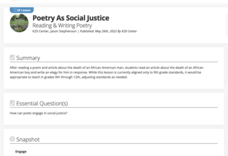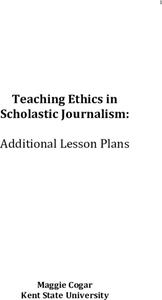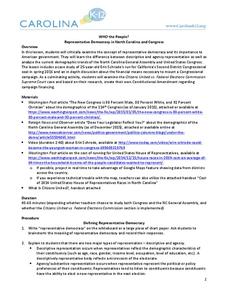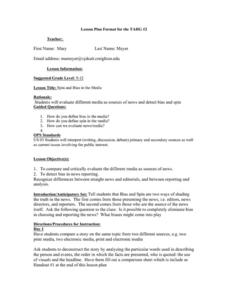Curated OER
Current Event Project
One of the best ways to make history relevant and engaging is to analyze current events before they become history! Check out these project guidelines for a current event research paper, outlining the major required sections of...
Brown University
Following the U.S. Presidential Election
Election years provide the opportunity to evaluate news media as well as the next prospective president. High schoolers read about the same event in several different news sources, varying in type, origin, and political leaning,...
PBS
Decoding Media Bias
Alternative facts? After watching the We The Voters film, "MediOcracy," viewers compare how cable news outlets CNN, Fox News, and MSNBC report the same story about politics or public policy. After a whole-class discussion of their...
K20 LEARN
Poetry as Social Justice: Reading and Writing Poetry
Words can be a powerful tool in the hands of a poet. Class members examine a poem written by Ross Gay in response to the death of Eric Garner and a news report of the same death. They then read an article about the death of Tamir Rice...
Kent State University
Teaching Ethics in Scholastic Journalism
Events in recent years have underscored the importance of a free and independent press in a democracy. Young journalists engage in lessons about the function of journalism in a democratic society, practice the steps of Bok's Ethical...
NASA
Using Models in Climate Change Research
Explore models through the relevant lens of climate change! Investigators watch a video about using models and their application for evaluating temperature data and climate change. Scientists read an article on climate change and answer...
Center for History Education
The Founding Fathers and the Constitutional Struggle Over Centralized Power
Believe it or not, the Constitution was America's second attempt at a democratic government. Academics travel back to the past to explore the shortcomings of the Articles of Confederation that would eventually lead to the Constitutional...
Newseum
Use ‘War of the Worlds’ to Teach Media Literacy
Orson Welles' 1938 radio broadcast of "War of the Worlds" is the focus of a lesson plan that looks at the importance of clarity in broadcasting. After listening to the radio broadcast, class members discuss the ethical obligations to...
Civil War Trust
Civil War Newspaper
One photograph can represent so much more than the images on the film. Eighth graders select a photograph from the Civil War era and conduct additional research based on the subject matter from the picture. Once they complete the...
BrainPOP
World History Lesson Plan: Uncovering Essential Questions
Have you ever noticed a news story revolves around an essential question? Scholars research methods of reporting historical events. Working in groups, they use an interactive module to gather information on a historical topic, uncovering...
Curated OER
Analysis of Newspaper Articles
Students investigate journalism by researching a list of articles. In this story analysis lesson, students read several current event articles and answer a list of study questions as a group. Students summarize the article and share the...
Carolina K-12
Who the People? Representative Democracy in North Carolina and Congress
Our elected officials are supposed to represent us, but what does it mean when they aren't like us? Budding citizens explore the demographic makeup of the US Congress, the role of money in political elections, and the Citizens United...
Curated OER
The News Behind the Story
What a fun way to analyze plot, setting, and character. Learners review story elements, read a short fictional story, then turn the events of that story into a headlining news paper article. Not only does this lesson engage critical...
Facebook
Versions of Media Texts
Verification of provenance and the original source of an image or video can be a long and winding process. Young journalists learn about the difficulty of finding the original source of a scrape, a copy of an original news story, and...
101 Questions
Representative Sample
At what point does data switch from being an outlier to part of the average? Scholars view conflicting news articles about protesters. They must decide which, if any, side is using the correct sample to draw their conclusions. It's a...
Curated OER
Nov. 2, 1976 | Carter Defeats Ford in Presidential Election
After reading about the presidential race in 1976, learners think critically about presidential legacy. They read all of the provided background information, related New York Times articles, and then respond to a writing prompt via blog...
EngageNY
Mid-Unit Assessment: Small Group Discussion: How Do Modern Poems Portray Modern Adversities?
How is a poem similar to and different from a news article? Pupils use a graphic organizer to compare and contrast the two genres. Also, as part of a mid-unit assessment, scholars participate in small-group discussions based on poetry...
Franklin D. Roosevelt Presidential Library & Museum
Pearl Harbor Activity #1: Newspaper or Radio Account
After listening to President Franklin D. Roosevelt's "Day of Infamy" speech, young historians research information about the Japanese attack on Pearl Harbor, possible motives for the attack, and the consequences of the attack. Scholars...
Curated OER
Writing Skills: Statistical Report
A simple text analysis lesson, language learners transfer, order, and group information so that it is presentable. No apparent link to the five required worksheets.
Curated OER
Spin and Bias in the Media
Learners compare different types of media. In this media comparison activity, students will assess the where all types of media gets its information by viewing a video of a news story and critiquing it.
Curated OER
Students Press Law and Ethics
Learners research the rights and the responsibilities of journalists in dealing with First Amendment issues. In this First Amendment lesson plan, students research the Alien and Sedition Acts and study the five elements of...
Curated OER
The Chesapeake Bay in Captain John Smith's Time
When Captain John Smith visited the Chesapeake Bay in the summer of 1608, what types of animals and habitats did he encounter? Your young historians will analyze primary source documents to answer this question, as well as compare...
Arizona State University
Journalism Lesson
Engage your pupils in a seres of journalism activities. For this journalism lesson plan, learners practice with AP style, analyze an article, practice writing leads, work with organizing information, and take a stab at writing headlines....
Social Media Toolbox
About Facebook
If everyone is on Facebook, should the school's news publication be as well? Scholars study a social media giant in the 11th lesson from The Social Media Toolbox's 16-part series. The activity combines individual study and collaboration...























